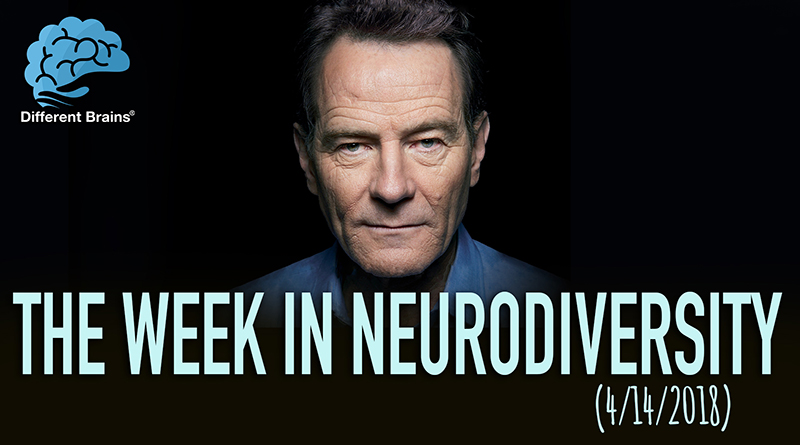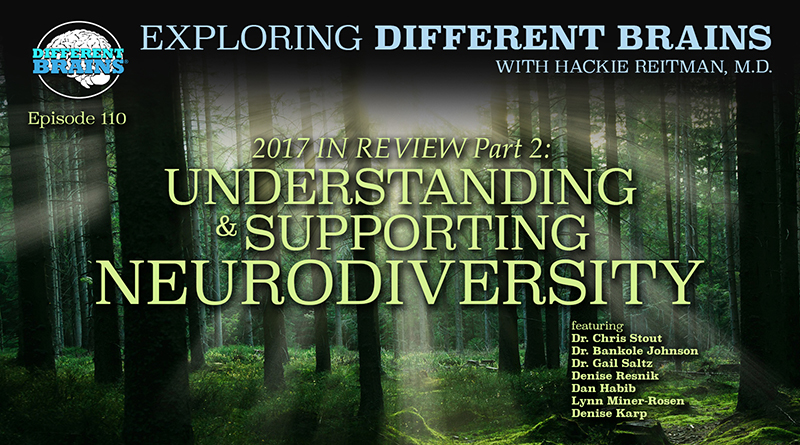Autism & COVID-19, with Dr. Stephen Shore | EDB 218
Autism self-advocate, author, and professor Dr. Stephen Shore offers tips for students on the spectrum during the pandemic.
(17 minutes) Dr. Stephen Shore is an autistic professor of special education at Adelphi University. He has written the books that include: College for Students with Disabilities, Understanding Autism for Dummies, Ask and Tell, and Beyond the Wall. Currently, he serves on the board of Autism Speaks, and is one of the first two autistic board members in its history, looking to improve the potential of those on the autism spectrum.
For more on Dr. Shore, visit: drstephenshore.com
AUDIO PODCAST VERSION:
Or look for us on your favorite podcast provider:
iTunes | Stitcher | SoundCloud
FULL TRANSCRIPTION
Welcoming Back Dr. Stephen Shore
DR HACKIE REITMAN (HR): Hi, I’m Dr. Hackie Reitman, Welcome to another episode of exploring different brains and today, we’re so lucky to have returning to us, my friend, who’s a professor at Adelphi. He’s on the board of autism speak. He is the man in autism. Stephen Shore. Stephen welcome.
DR STEPHEN SHORE (SS): Oh! Thank you, It’s great to be here, Good to be back again, I think for the third time.
HR: Yeah, you are the leading contender here, like it. Now look, you’re at Adelphi right?
SS: Oh well, I actually.. I teach at Aldelphi but like all of us, we are confined to our homes.
HR: Is that why you have the “H” is it for home, on your hat?
SS: Exactly.
HR: (Laughs.) You’re good, you’re really good. You know I’m familiar with your journey, but why don’t you..why don’t we start out, letting our audience know about some of the highlights of your fantastic journey.
SS: The journey starts at the beginning after 24 hours of age. There was a baby picture of me and my wife says, “I look like an egg.” Then things develop pretty typically, in the first 18 months, where I then was struck with the regressive autism bomb. And that happens about 30% of us on the spectrum and I lost functional communication, had meltdowns and proof in the environment and in brief that I became a pretty autistic little kid. It was so little known about autism in those days that it took my parents a whole year to find a place for diagnosis and when they did, the doctor’s said that they never seen such a sick child and they recommended institutionalization. Unfortunately, my parents like we see so many parents today, they advocated on my behalf and convinced the school to take me in about a year. And it was during that year that my parents implemented what we would today refer to as an intensive home-based Early Intervention Program and it was the program emphasizing music, movement, sensory integration, narration and imitation. So, it probably looks like one of the most developmental approaches we have today, Such as Miller method or floor time or RDI and with the work that my parents did, speech began to return at age 4. I got admitted to the school that I initially rejected me, I got re-evaluated. Instead of being considered a psychotic and ready for an institution, I got upgraded to neurotic so things were looking better. And I know you said something Hackie but you’re nonverbal at this point.
HR: Mazel tov! (Laughs.)
SS: Ah! Thank you, thank you! My parents, well at age 4, they found me taking apart a watch with a sharp knife. I extract the motor, take off the gears, play with them and spin them around I like things like that spin, then put them back together and the watch still work and there weren’t any pieces left over. The lines of demarcation between ability and disability that autism can bring to us are really sharply defined. One of the worst experiences I can have in school other than bullying would be to walk into a classroom with a paragraph on the board because that meant we were going to have to copy it down. And by the end of the class period, I’d gotten through a few words and everybody else had gone to recess. Well now we jump up to middle and high school you don’t need to be autistic to have difficulties in middle and high school. But for me it was actually easier because I was able to engage in my focused interests of music and music was great for being a structured activity to mediate my interactions with others. I got so tied up in music that I got it into my autistic head that I needed to learn how to play all the instruments, every last one of them. So I’d spend hours in the instrument closet, figuring them out and while I didn’t get all of them down, I did get it up to about 15 then when I heard that a requirement for a degree in music education was that you had to learn all the instruments so what could be better than that. So, then it was off to college and I studied Music Education, it was the greatest thing I felt like I could do. I had a good time, the bullies were gone, I had more friends, I wanted to ride my bicycle at midnight, I can find someone just as strange as I was to also ride at midnight.
Dating occurs in college and that was something that I always found confusing never could quite figure it out but I’ve been married for a little over 30 years now so I don’t have to worry about that. Well then it was on to graduate school, where I continued my studies in music, then started a doctorate in Music Education and I completed all the coursework in that doctorate they started getting more interested in autism. So I defected to the school of special education, got my doctorate in special education focusing on autism, I started writing books and traveling around the world talking about autism and got a job as a professor at Adelphi University teaching courses mostly in autism but in special education in general. So the pre-pandemic, so before March…I was visiting a different country about once a month. I had gotten up through 51 countries, 52 I’m not sure that will be, but when it becomes safe to travel I think a Philippians are pretty high up there and being one of the contenders for being number 52. And so, here I am, where I divide my time, mostly teaching courses relating to autism, mostly. And some in special education researching about autism, at the university. Also writing books, articles related to autism and well I was traveling but now I’m sitting in front of this computer probably in via Zoom, and still presenting in a number of different countries and different states in the United States. And then finally giving music lessons to autistic children and that’s what brings me here.
Effects of COVID-19 on Students With Autism
HR: Fascinating history you have and now that you’re teaching others at Adelphi, tell us what your observations have been regarding how the coronavirus times we now have thrust upon us, how they’ve affected you and how they’ve affected your students.
SS: Oh well it is a big challenge, it affects me, it affects my students, it affects the people who are present above. To the educators, the parents and others can support autistic individuals. What comes to mind immediately is what I call “the big three” and those big three are supporting autistic individuals is one, you’ve got to keep to keep the routines the same as much as possible. So you keep routines the same and of course, you’ve got to modify the ones that you have to as similar as possible. So one example might be, the autistic person who goes to school or goes to work, either one. The morning routine is all the same from getting out of bed, having breakfast and then things change when it’s time to travel to school or to work whether it’s driving or by bus, or walking or whatever it is and that’s when we start making changes. The 8:30 for example and it’s time to catch that bus and maybe you have a nice picture schedule that has a picture of a yellow school bus, That’s how you get into school. Why you have to exchange that from picture of say a desk that in a room in a house… you got to have a picture of that.
And you make a big deal about walking from wherever that student was. Maybe in the den watching TV while waiting after breakfast whatever it is going from there to school and now that we’re in school, also keeping the school’s schedules as close as possible. So, most…most classes begin, I should say most school days begin with some sort of attendance taken. Common layouts in schools have all the students that sit in a semi-circle near a wall and on that wall, is a big poster of a home and another poster in school. Each child is called upon and recognized maybe that child gets up and pulls their picture off of the poster at school and the nice satisfying tear sound that you get and when you use velcro and you walking over to a picture of school and you just attach it to school. Or we could have a similar thing at home where we go from whatever the student was living room, dining room, bedroom, kitchen to the desk where they’re doing the day’s, learning and that open circle, opening Circle. Well, maybe the parents and other siblings get in on it too and their by replicating what’s happening at school. Schools also tend to have a mid-morning snack, lunch. Whatever the other activities and classes that they teach…and we reverse the process so that’s an example of the first of the big three that is routines, keeping them the same or as similar as possible. The second one is communication and we touched on that a little bit where we communicate in the style that their child best understands.
So, if that means using a picture schedule than that’s what you use. If it’s using words like were talking now, that’s what we also the use, so communication piece. And then finally is the self-care peace and this is for Hackie and it’s for everybody else who takes care of an autistic person and it can also be for autistic people as well, who can learn to do various things in order to keep themselves calm in this time of heightened anxiety. So, what can we do to keep ourselves calm? Maybe it’s just as simple as taking in a deep breath and thinking about inhaling come from the environment and when you exhale, your exhaling stress and anxiety or another option might be to as you breathe in, you make a fist with your hands and then when you breathe out, you let your hands relax and you spread it out spread them out you do this three or four times, You’re going to be more relaxed. You can even take it one step further with when you breathe in, you put your hands together, palms facing each other and the way that some people pray and then when you breathe out, you pull the hands apart. So those are the big three that come into mind when it comes to coping during these challenging times and certainly had to make adjustments to my own schedules.
Challenges to Teaching During the Pandemic
HR: Well, The Big Three certainly makes a lot of sense, certainly does. What is your biggest present challenge teaching?
SS: My biggest challenge now is making sure that I reach all the students in an interactive manner. My teaching tends to be very interactive which is different than doing a more didactic presentation because I realized and I could talk about this too, I realized that students like back and forth conversation more than just being lectured to. And that was something I discovered about…I think about a couple of years into teaching at Aldephi because what I found is that when I walked into the classroom, students, most of the students were already there, they were all talking to each other and it seemed like they were engaging in excessive and Grotius social Interaction. And it was really loud, It would hurt my ears and warned them to quiet down right away but you know, I just kind of put up with it until it was time to start class and then the student would quiet down really quickly and I could get on with my lecture and pretty Power points and so on and everybody would go home happy or at least I hoped they did. However, one day I decided to just listen, what are these students talking about anyways before class started? And I found that they were talking about the course material which made me realize that maybe they want to maybe…maybe they prefer to have more discussion and as long as our discussion covered all the material that I wanted to cover anyways, then let’s spend more time talking about it instead of being lectured to about it.
HR: How can people find out more about what you do, Stephen?
SS: Well, one way is to go to my website, Which is; www.dr.stephenshore.com. I also have a number of videos on YouTube, Facebook, and also my LinkedIn account.
HR: That’s great. Is there anything Stephen today that we have not covered that you would like to cover?
SS: Well, I’ve been involved in this interesting project called “Learn Autism” which is a video portal for supporting parents and providing research-based-information in bite sized video chunks. So you may want to check out learnautism.com. I’ve got some videos there and many other people have videos there and what we do is we explore all kinds of areas related to autism, the words, educational strategies, maybe it’s inclusions, sensory issues, navigating transitions to adulthood in the areas of employment, continuing education for those of us who are going to college, relationships and sexuality, how we’re going to be living — residential issues. And just about everything else you’ll find there as well.
Advice for People With Autism During the Coronavirus
HR: Professor Stephen Shore what is one piece of advice you would have for an autistic individual during these unique coronavirus times?
SS: My advice for us autistic people during these uncertain times is to focus on your strengths, focus on your abilities, and how can you use those abilities in which to be a better student or perhaps, find employment, and to bring yourself joy in life.
HR: Well Stephen, It’s been a pleasure to have you here, good luck with all your teaching at Aldelphi and thanks for being a leader as a self-advocate and teaching autism, about autism, and how to help all of us. Thank you very much Stephen Shore.
SS: Well thank you.





